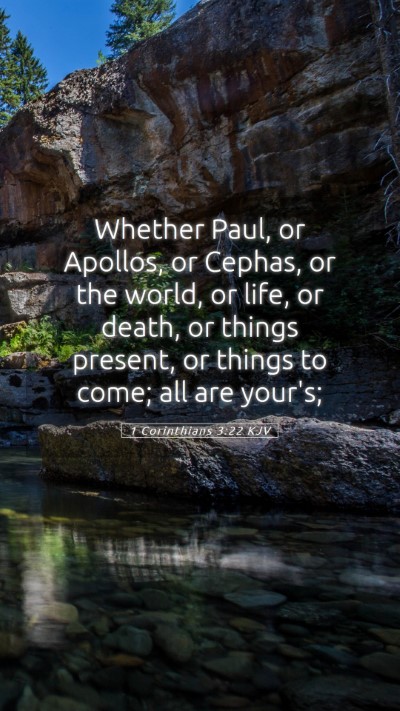Understanding 1 Corinthians 3:22: A Comprehensive Commentary
In 1 Corinthians 3:22, the Apostle Paul writes, "Whether Paul, or Apollos, or Cephas, or the world, or life, or death, or things present, or things to come; all are yours."
This verse encapsulates a profound truth about the interrelatedness of Christian leaders and the believers they serve. This commentary draws from the insights of notable public domain commentators such as Matthew Henry, Albert Barnes, and Adam Clarke to provide a thorough understanding of this scripture.
Verse Context and Meaning
In the broader context of Corinthian correspondence, Paul addresses divisions among the believers, where loyalty to different leaders had caused discord. The essence of this verse emphasizes that all things, regardless of their source, ultimately belong to the believers in Christ.
Insights from Commentators
-
Matthew Henry:
Henry explains that the various leaders mentioned (Paul, Apollos, and Cephas) represent different gifts and ministries in the Church. He reinforces that rather than creating factions, these leaders should unify believers under the common goal of glorifying God.
-
Albert Barnes:
Barnes highlights that the phrase "all are yours" signifies the privileges and responsibilities that come with faith. He notes that Christian maturity involves embracing what each leader offers while recognizing that all are instruments of God’s grace.
-
Adam Clarke:
Clarke elaborates on the implications of "the world" and "life or death." He suggests that this indicates a complete liberation from the fears that bind the worldly-hearted, indicating that believers have a kingdom perspective where earthly matters do not hold ultimate sway.
Key Themes and Interpretations
The implications of this verse extend into various theological and practical realms:
-
Unity in Diversity:
Paul’s message encourages believers to appreciate the diverse gifts within the church rather than allowing these to fracture community. Unity in Christ transcends individual leadership styles or preferences.
-
Ownership and Stewardship:
The phrase "all are yours" emphasizes that believers are stewards of the gifts and teachings of their leaders. In understanding Bible verse meanings, this invites reflection on how believers can wisely use the resources and teachings bestowed upon them.
-
Assurance of God’s Sovereignty:
Paul reassures believers of their security in Christ, including all present and future circumstances. This aligns with the biblical exegesis highlighting God’s providence over every aspect of life.
Application of the Verse
Understanding 1 Corinthians 3:22 provides significant insights into daily life and Christian interactions:
-
Embracing Community:
Believers are called to foster a sense of community and collaboration, recognizing the value that each member brings to the body of Christ, including leaders and fellow Christians.
-
Encouraging Growth:
The acknowledgment that leaders and their teachings belong to believers should motivate individuals to seek growth in spiritual knowledge and application.
-
Living Ambitiously for the Kingdom:
The understanding that ‘the world’ and ‘life or death’ are under the Christian’s domain urges believers to act fearlessly in sharing faith and expanding the kingdom.
Related Bible Cross References
- Romans 8:32 - “He who did not spare His own Son, but delivered Him up for us all, how shall He not with Him also freely give us all things?”
- Ephesians 1:3 - “Blessed be the God and Father of our Lord Jesus Christ, who has blessed us with every spiritual blessing in the heavenly places in Christ.”
- Philippians 1:21 - “For to me, to live is Christ, and to die is gain.”
Conclusion
In summary, 1 Corinthians 3:22 conveys essential themes around unity, stewardship, and the totality of God’s provision for believers. Engaging with this scripture through various lenses heightens our understanding and appreciation of the underlying principles guiding Christian community and faith. For those involved in online Bible study or Bible study groups, bringing these insights into discussion can enrich the learning experience and spiritual growth of participants.


